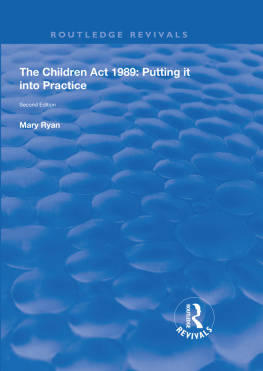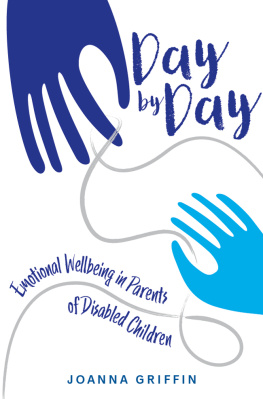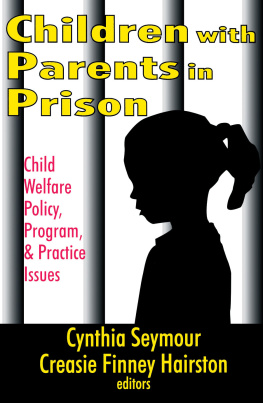Parents as Care Managers
For Marion Boyd Thomson
First published 1999 by Ashgate Publishing
Reissued 2018 by Routledge
2 Park Square, Milton Park, Abingdon, Oxon OX14 4RN
52 Vanderbilt Avenue, New York, NY 10017
Routledge is an imprint of the Taylor & Francis Group, an informa business
Copyright Gillian Bridge 1999
All rights reserved. No part of this book may be reprinted or reproduced or utilised in any form or by any electronic, mechanical, or other means, now known or hereafter invented, including photocopying and recording, or in any information storage or retrieval system, without permission in writing from the publishers.
Notice:
Product or corporate names may be trademarks or registered trademarks, and are used only for identification and explanation without intent to infringe.
Publishers Note
The publisher has gone to great lengths to ensure the quality of this reprint but points out that some imperfections in the original copies may be apparent.
Disclaimer
The publisher has made every effort to trace copyright holders and welcomes correspondence from those they have been unable to contact.
A Library of Congress record exists under LC control number: 99072593
ISBN 13: 978-1-138-33527-1 (hbk)
ISBN 13: 978-0-429-44389-3 (ebk)
Flow chart
Source of participants
Local authorities
Interviewees
When diagnosed
Cause of the condition as reported by parent
Type of cerebral palsy as described by parent
Gender of children
Mobility
Ability to sit unaided of those not walking
Ability to feed themselves
Mothers who are graduates
Intellectual impairments/learning difficulties
Continence
Marital status
Mothers who work
Family size
Help from family members
Special person
Health visitors
Physiotherapy
Occupational therapy
Speech therapy (totals)
Speech
Speech therapy (conductive education centre users)
Referrals to CDC
Alternative medicines
Budapest/Pet Institute
Speech therapy (Bobath users)
Bobath
Statementing
Portage
Special education
Boarding school
Respite care
Equipment
Social workers
Family support
ADSS Association of Directors of Social Services
CDT Child Development Clinic
CHV Community Health Visitor
CP Cerebral palsy
DffiS Department for Education and Science
DH Department of Health
DHA District Health Authority
DHSS Department of Health and Social Security
DLA Disabled Living Adviser
EWO Education Welfare Officer
FHSA Family Health Service Authorities
GP General Practitioner
IPSEA Independent Panel on Special Education Advice
LEA Local Education Authority
LMS Local Management of Schools
NCB National Childrens Bureau
NHS National Health Service
OPCS Office of Population and Census Studies
OT Occupational Therapist
SATS Standard Attainment Tests
SBU Special Care Baby Unit
SSD Social Services Department
ST Speech Therapist
UK United Kingdom
This book fulfils my promise to the 58 families who participated in this study that I would tell their stories, although changing their childrens names to ensure anonymity. I am grateful to them for their willingness to share very painful experiences. Sincere thanks are also due to many colleagues at LSE and in particular to Sally Sainsbury, Robert Pinker and Eileen Munro who have read and provided helpful comments on numerous drafts and have sustained me when confidence was low. Michael Bentham did a brilliant job with the tables. Margaret Tamayo proved to be a meticulous editor. As I limped along to the finishing post Julia Shaw provided much needed technical expertise. I am grateful to my family for allowing me to spend so much time doing this work and above all for believing in me.
Caring for disabled children is a subject of current interest. A cascade of change has been initiated by legislation affecting policy and provision for the care of disabled people in the community. The National Health Service and Community Care Act 1990 has introduced new systems for caring for people within their families. The Carers (Recognition and Services) Act 1995 provides a platform for carers (often parents) to have their own needs taken into consideration alongside those of their disabled children when social services departments undertake community care assessments. The Disability Discrimination Act 1995 underlines the entitlement of disabled people to full citizenship.
The plight of families with a child born with cerebral palsy continues to receive considerable press coverage. Headlines such as Doctors clash on the right to live
During the post-war years, social policy has been directed towards transferring the minority of children with disabilities who were still cared for in NHS institutions and boarding schools to those with parental responsibility for them at home in the community. This normalisation process was influenced by Bowlby and reinforced by Wolfensberger.
Utting expresses concern about residential care in a Department of Health review of residential childcare, which endorses the Children Act Guidance and Regulations on residential care.
This study concentrates on the increasing number of disabled children (the Department of Health estimates 98.5%) being cared for at home. The process designed to meet their needs originates in the NHS and Community Care Act 1990, which requires the social services departments to assess the needs of persons who may require community care services, to ensure that people are not fitted into existing services, but that services are adapted to individual needs.
Disabled children meet the criteria for the care management system. It is intended that the two programmes (NHS and Community Care Act and the Children Act), should be consistent and complementary and set a fresh agenda and new challenges for social services authorities for the next decade. There is no intention of creating a division between child care and community services and they should form a coherent whole.
The assumption of primary responsibility for their young disabled child implies that main carers (usually mothers) must make choices from treatments, services and educational facilities to enable their children to live as normal a life as possible. The expectation from the Children Act Guidance is that this process of care management should be achieved by partnership with parents, so that all necessary expertise is marshalled ... within and beyond the SSD .
Provision is to be the responsibility of the NHS, social services, voluntary and private agencies and education departments, who should coordinate packages of services from multiple service providers.
Moreover, the Department of Healths policy guidance on the purchaser/provider model requires active participation by professionals to ensure purchasing a package of care, assembled from the public, voluntary and private sectors, and periodic reviews to ensure a wider choice of services across the statutory and independent sectors, and better integration of services within and between agencies. This description does not fit comfortably with the assertion that in some situations users and carers might act as their own care managers.






